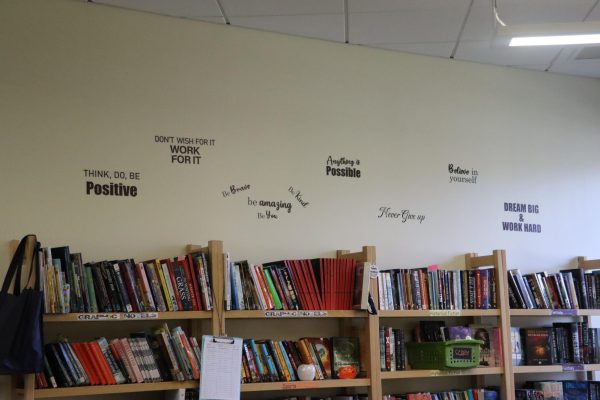Adapting to a New Country and Language
It is not easy having to move to a new country, learn a new language, and adapt to a new culture, but for many students at The Morgan School, this was something that they had to do to start a new life in another country, like junior Camila Acevedo.
Acevedo moved to the U.S. at the beginning of her junior year, right before summer was about to end. In just the seven months she has been at the Morgan School, she has been able to comprehend the language a little bit better, but it has been a tough journey to get to where she is at now.
“Coming to a new country has been really hard,” said Camila. “I had to adapt to a new culture, as well as learn a whole new language, but I have tried my best to communicate with people, although sometimes it can be frustrating when I don’t know how to express myself.”
Challenges in the Classroom
For Acevedo, having to do work in classes without clear instructions from her teachers made her journey a little more difficult than other students. She had to go out of her way to do further research and translating in order to work on her assignments and get them done.
Since Google Translate is a tool that everyone has access to, that translates text, documents, and websites from one language to another, it has been easier for teachers to just translate an assignment and hand it to a student. For students like Acevedo, there

are often key details and explanations lost without the teacher’s verbal explanation of the assignment. This leads to a lot of confusion and frustration to non-english speaking students who are not able to understand how to do an assignment.
While translated work does help, Acevedo has found that teachers often “don’t take the time to actually teach me, and communicate with me.” Instead, they hand out a paper. Acevedo believes that one thing teachers could do to help her is “coming up to me and actually trying to speak to me and make me understand rather than just translating the papers and work for me.”
The Silent Period in Language Learning
For students like Acevedo there is often this six month period where they don’t really talk and they like to listen and interpret more in order to learn. This could be complicated for teachers because it limits the conversation they are able to have with their students.
ESL teacher Erin Milichi says, “There’s another thing in language acquisition theory that’s called the silent period, and it usually lasts six months to a year. There’s a period when you are learning receptive language rather than being able to talk and use the language you’re learning by listening.”
According to the article by ASHA Wire, the six-month period is a time for observing those around them, digesting what they hear, and building an understanding of the new vocabulary and syntax. This is what multiple students experience while they are trying to learn a new language and take in what they hear. This is said to cause students to not be open to talking in English until they take the time to understand it first.
ESL Support at The Morgan School
Spanish-speaking students here at The Morgan School are provided with ESL classes, to help non-native English speakers learn and improve their English language skills, encompassing listening, speaking, reading, and writing.
Throughout time at Morgan, things have changed drastically in the number of Spanish speaking students. For example, in 2009 there was barely even 1 percent of students who spoke Spanish as a first language, whereas today, about 20 percent of students at Morgan are Spanish speaking students. Because of this change, more ESL teachers have been hired in order to get the students the help they need with being able to speak English, including Ms. Milichi who was brought on this year.

Although students are receiving a lot of help from ESL classes that are offered at school, students who are learning English are still looking in other places for help with learning English
“The school hasn’t really helped me that much to learn the language,” said Acevedo. “I mostly have learned from being around other students speaking English, social media, and some of the ESL classes. Along with that, I am not really comfortable speaking with many students in English because of the way I pronounce things.”
There are teachers at Morgan that are trying their best to get students to learn English, and getting them to step out of their comfort zones to talk to more teachers and students, according to Acevedo and many Spanish speaking students at Morgan.
Comparing Experiences: Learning a Second Language
The problem of learning a new language is not unique to ESL students, though, and might provide a clue to how to best help the students today. There are other instances where English-speaking students have also been through something similar in having to learn a new language if they are taking a Spanish class. Students who are in Spanish class are required to speak the language and understand it in the class, bringing lots of confusion and difficulty for them.
Laura Luther, a Spanish teacher at The Morgan School, teaches mostly higher-level Spanish classes. Her main focus has always been to teach students the language and get them to be able to have conversations in Spanish.
“I think that if a student is motivated to learn, they’re going to learn no matter what,” said Luther. “I think it depends on the person and their interest in learning.”
Luther has always pushed her students to try their best in her class, focusing on speaking to the students in the target language to get them to learn. The more practice they receive, the better they start to become at speaking the language, along with all of the assignments they are required to complete in the target language.
Finding Comfort in Learning English: What Helped Her Adjust
Speaking in a new language could often cause discomfort for many people because of the accents they might have or the way they pronounce certain words, and the fear that they might say the wrong things or even not know how to express themselves.
Acevedo states that it is important to note that she is “not uncomfortable” but she feels as though the school “has not done much to help me feel more comfortable with not knowing the language.”

What does she wish the school would do more of?
Though Acevedo has learned a lot during the school year she often wishes that teachers would try to communicate with her more, so she is able to practice her English and her interactions with people in English.
The main thing that Acevedo has done to help her master the English language is to “listen and talk to others around me,” and that has taught her more than any of her other classes because she is able to listen and speak the language and get the practice that she needs.



